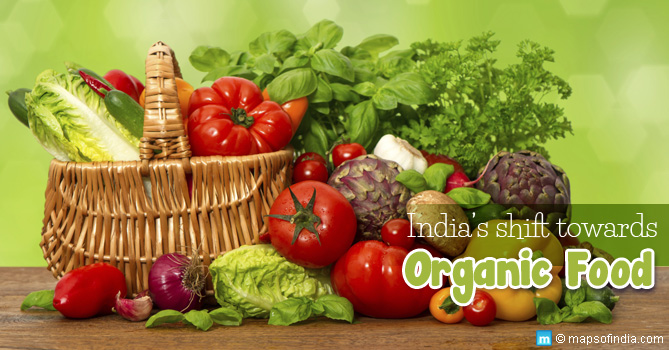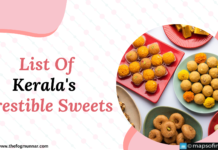Spread of Organic Food
Back in the 1960s and the 1970s, India sensed a keen need to multiply its agricultural need in order to sustain a burgeoning population. The country’s Green Revolution was a combination of visionary leadership, dynamic support from the Indian Agricultural Research Institute, and enterprising farmers who put these developments into practice through the length and breadth of the country. While the country certainly reaped the rewards of this major agricultural restructuring in the form of increased yield and greater exports, there was a price to pay as well. Increased use of chemical fertilizers, pesticides, and insecticides has taken the nation and Indian society far from traditional farming methods and organic food. The adverse effects of these fertilizers and chemicals are now a major concern in India. Apart from these, soil degradation and decline in natural minerals and biolife due to their indiscriminate use are now another major worry.
The shift in India towards organic food is not a surprising one. It is a return to the original ways of our ancestors. Not only were we growing natural and organic foods in ancient India, we were almost holly reliant on herbs and plant extracts for healing medication and health food. It is to this glorious lifestyle that modern India is now returning.
Organic Farming in India
India, and in fact many of the developing nations, are at the epicenter of an organic farming revolution. According to reports from the International Federation of Organic Agricultural Movements (IFOAM) in 2013, there were about 2 million farmers worldwide who stuck to organic farming methods. While it is naturally assumed that most of these may belong to Europe or even the Americas, data speaks differently. About 80 percent of these organic farmers of the world are based in India. Some 600000 of these farmers are certified organic farmers while others have simply stuck to the age-old practices of agriculture.
Rise of Organic Farming Worldwide
Growing popularity and awareness of the health benefits of organic food worldwide, has increased its demand quite considerably. According to IFOAM data, in 2000 some 86 countries of the world reported practicing organic farming methods and producing about USD 15 billion worth organic food. By 2012, the number of countries where organic farming methods were practiced increased to about 164 and USD 64 billion worth organic food was produced. Each year some 200,000 farmers apply with the IFOAM to get certified as organic farmers. India is one of the countries where new entrants into the “organic” world are highest in number. Then again, it must be said that these new entrants are not new at all but it is organizations such as the IFOAM that have not started to take notice and certify a number of traditional Indian farmers as organic cultivators. India’s importance in the organic agricultural map of the world may be determined by the fact that the Organic World Congress of 2017 is scheduled to be held in New Delhi, the capital city of India.
Turning the Tide
In India, a country where organized farming has not quite caught on as in the west, the cost of buying artificial fertilizers and pesticides has often been out of the reach of the ordinary farmer. The lack of modern means of agriculture has been counted as a major shortcoming, especially since the Green Revolution. This is now set to change. The lack of artificial aids and chemical additives makes these small farms excellent organic producers. What is necessary, though, is for organizations such as the Organic Farming Association of India and for the Ministry of Agriculture to promote awareness among the poor standalone farmers about organic farming. The necessary interface between these farmers and the retail market is currently absent, and bridging this gap will remain an important move to promote India as one of the world’s prime organic farming destinations.
Fakes and Brand Dilution
The greatest challenge faced by India in its endeavour to become one of the largest organic food producing nations is the lack of adequate quality checks and standards. In early 2015, the Food Safety and Standards Authority of India (FSSAI) was challenged by the Crop Care Federation of India (CCFI) for allowing companies to indiscriminately use the ‘organic’ label despite not complying with necessary standards. The FSSAI had issued certificates to non-organic food producing companies and allowed food to be wrongly labeled, said the CCFI. Some of these foods came from very popular FMCG brands and their advertisements were deliberately misleading. The FSSAI also seems to have overlooked the need for sample testing and booking violators in the past 8 years. According to the Food Safety and Standards Act of 2006 mislabeling of foods may attract a fine up to INR 3 lakhs.
Where Do I Find Organic Food?
Availability of organic produce is a major challenge faced by the health conscious buyer in the country. Most depend on branded retail shops such as Nature’s Basket to obtain organically grown fruits, vegetables, grains, and herbs. Such wholly organic food selling retail outlets are, however, a feature of metropolitan cities such as Mumbai, Delhi, and Bangalore. The rest of the country depends on farmer’s markets where one must rely on the word of the seller. Under laboratory conditions, though, most of the produce sold here is likely to test positive for pesticides. In fact, tests conducted on produce sold as organic in Delhi in 2014 revealed that about 33 percent contained traces of pesticides. Lack of labeling in case of vegetables and fruits becomes a major concern for the buyer.
Organic Food FAQ
Q What is Organic Food?
A. Organic food is food produce which has been grown on farms using environment-friendly practices and is free of artificial fertilizers, and chemical insecticides and pesticides. Organic food does not include any form of genetically modified crop.
Q Are organic foods grown without fertilizers?
A. Organic foods are grown with natural fertilizers such as manure and compost as opposed to synthetic petroleum-based or sewage sludge-based fertilizers.
Q How are weeds and insects controlled in organic farming?
A. Instead of using chemical herbicides weeds are controlled by natural methods such as hand-weeding, crop rotation etc. Certified natural insecticides are also used.
Q Are organic foods healthier?
A. Organic foods are fresher, though they may not last long in storage. They contain no traces of chemical pesticides unlike conventionally grown foods. This makes them a much healthier food choice.
Apart from this, organic farming is also eco-friendly. It does not involve any of the air, soil, or water pollutants used in traditional farming. This makes the world a better place for us.
Explore More :
India’s Organic Food Revolution
Organic Food in Your Terrace Garden
Organic Products Business in India




